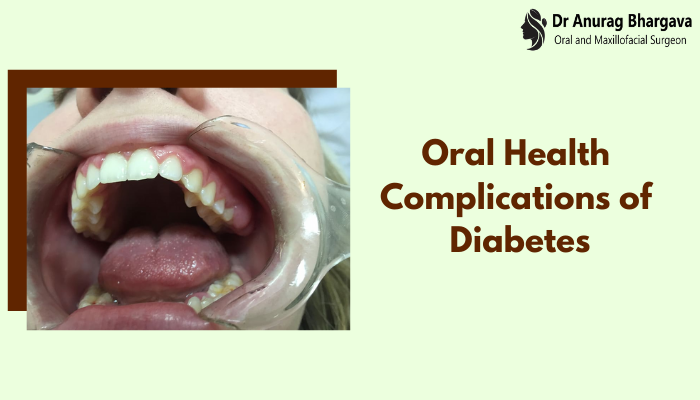There are 422 million people worldwide affected by diabetes, and around 1.6 million deaths occur because of diabetes, especially in low and middle-income countries. The number of cases of diabetes still continues to grow for the past few decades.
The food we eat turns into sugar and is used to generate energy. The body’s ability to process sugar is targeted by diabetes. The body does not make enough insulin in Type I diabetes. Insulin is a type of hormone that takes sugar to the cells that need it for the energy from our blood. The body does not respond to insulin in Type II diabetes. There are high blood sugar levels in both these cases, which affect various parts of our body including our eyes, nerves, kidneys, heart and mouth.
Why do People with Diabetes have Oral Health Complications?
Those who have higher irregular blood glucose levels because of diabetes have a higher risk of gum diseases and tooth problems as compared to the people not having diabetes. The reason for this is their low resistance to infection, which is why they don't heal as easily.
You have to pay great attention to your complete oral health that includes controlling your blood glucose levels as well as your dental care. For proper care and advice, you must regularly visit your dentist to keep your gums and teeth healthy.
Below are some common oral health problems that affect people having diabetes:
- Gum abscesses
- Periodontal (gum) disease
- Fungal infections such as thrush
- Tooth decay
- A dry, burning mouth (low saliva levels).
- Mouth ulcers
- Lichen planus (an autoimmune skin condition, inflammatory)
- Taste disturbances
Periodontal (Gum) Disease with Diabetes
An infection that destroys the bone supporting and surrounding the teeth causes the periodontal (gum) disease. This bone is responsible for holding our teeth into our jawbone and making us comfortable while chewing something. Dental plaque, like food debris and bacteria, are important for this gum disease. If the plaque is left on the gum and teeth, it hardens and forms tartar or calculus. The formed calculus and plaque then irritate the gums surrounding the teeth so much that they become swollen, red and start bleeding. The gum disease continues to progress because of which more bone gets lost. The teeth too become loose and might need to be removed or fall out all by themselves.
The people with blood glucose levels less than the highest standard are more prone to have this gum disease. Their low resistance to infection and decreased healing capacity is one reason behind it. So, it is very essential to take care of your oral health and prevent gum disease & oral health complications of diabetes by controlling the blood glucose levels. It happens both ways. People having a standard blood glucose level face no difficulties during dental treatment, and treating gum diseases in people with diabetes, helps to improve their blood glucose levels.
Symptoms of Periodontal Disease
If you notice any such symptoms and signs of gum disease below, please consult your dentist quickly.
- Gaps opening up between your teeth
- Swollen, red, and tender, bleeding gums
- A bad breath and bad
- Gums that become loose and pull away from your teeth
- Loose teeth – when your teeth are placed together this changes the ‘feel’ of your bite or may also make dentures fit differently
- A continuous discharge (pus) producing from the gums
Oral Fungal Infections with Diabetes
Candidiasis (Oral thrush) is a kind of fungal infection which is caused by the overgrowth of Candida albicans, a yeast that occurs in the mouth naturally. Other conditions that contribute to diabetes are high glucose levels in saliva, low saliva levels (dry mouth) and poor resistance to infection.
The red and white patches on the skin of the mouth that can be the reason for ulcers and discomfort are also caused by oral thrush. To treat oral thrush successfully, standard blood glucose levels and good mouth hygiene are necessary. This condition can be treated by the dentists prescribing antifungal medications.
Tooth Decay with Diabetes
People suffering from diabetes may have very dry mouths and more glucose in their saliva, as their blood glucose levels are continuously increasing. In such conditions, there are chances that dental plaque gets build up on teeth causing cavities and tooth decay. If our teeth and gums are cleaned thoroughly for two times a day with fluoride toothpaste and toothbrush, dental plaque can be completely removed from the mouth. Dental floss or interdental cleaners can also be used to clean between the teeth. Also, taking care of the teeth regularly can definitely prevent gum diseases and cavities.
Any queries or feedback for us? Do mention in the comment section below.

